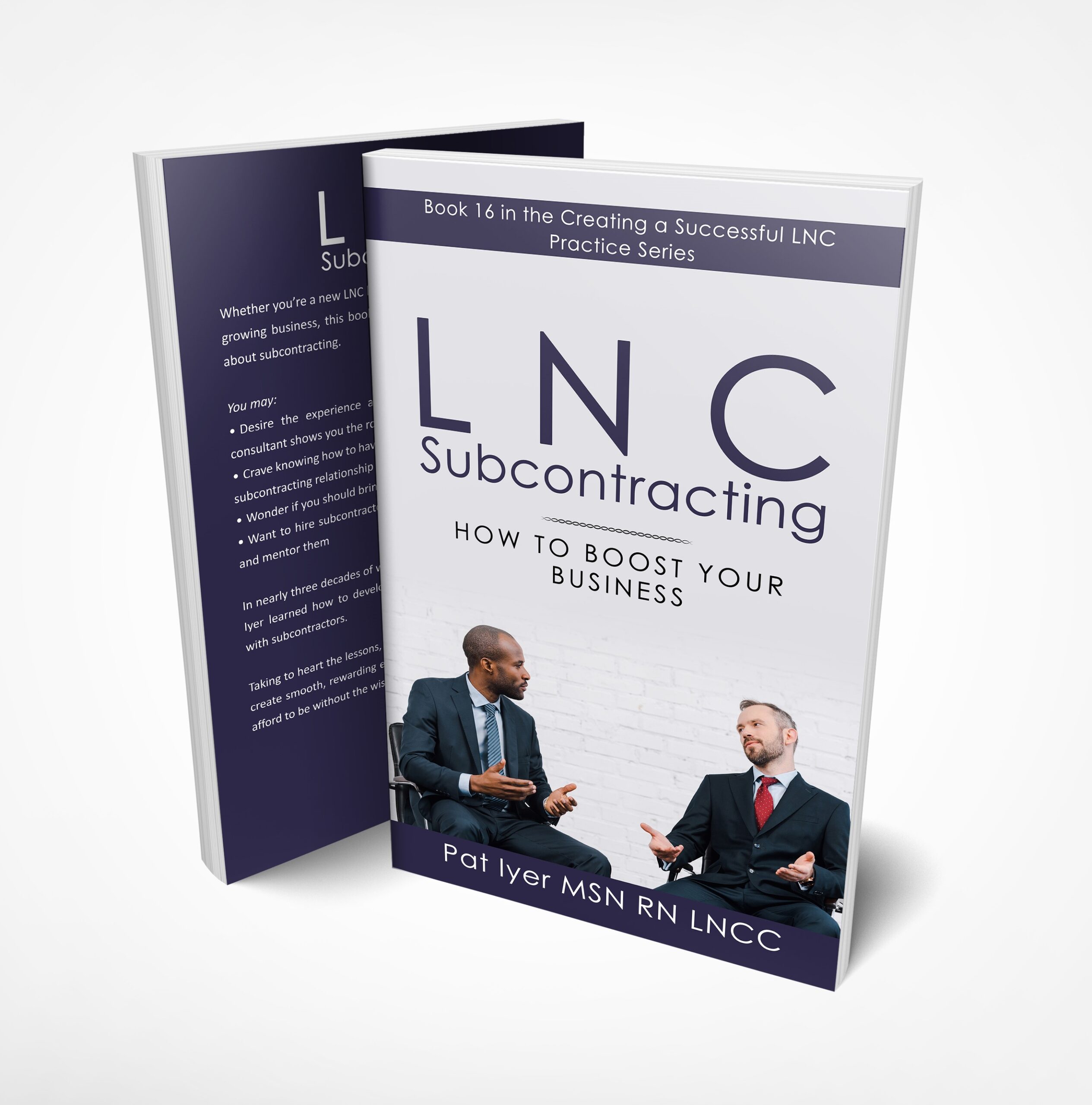The LNC Financial Aspects of Being a Subcontractor
 Do you know the LNC financial aspects of being an LNC subcontractor?
Do you know the LNC financial aspects of being an LNC subcontractor?
Of course, you may think you do. But tax regulations change, and your state or country’s regulations may vary from the content in this blog. Check with a qualified tax expert to be sure what you do as a subcontractor complies with the laws. I am not giving tax or legal advice.
When people think about subcontracting, they may fall victim to myths that they believe are real. To have a clear picture of this field, I must dispel some principal myths. This blog’s myths relate to the legal and financial aspects of subcontracting.
Myth #1 There is no difference between an independent contractor and a subcontractor.
The Truth: Independent contractors are those who labor for themselves. They own a business and receive payment for a project or a specific period. They set their rates and schedules for payment. In the LNC world, these are the LNCs who hire other LNCs or physicians as subcontractors.
The subcontractor works for an independent contractor. A written agreement usually governs their relationship. Payment comes from the independent contractor and represents a portion of what the independent contractor received from the client.
Myth #2. When you’re a contractor, you can only work for one person.
According to this myth, you can’t accept work from another source.
The Truth:
You should seek work from other sources when subcontracting.
This practice will enable you to comply with specific U.S. Internal Revenue Service regulations.
Be open to working with various people directly with attorneys, or with other legal nurse consultants who give you subcontracting work. Avoid getting into agreements with independent contractors who want to prevent you from working with other LNC firms or directly with attorneys.
Myth #3 The attorney or independent contractor said I am a subcontractor, so that must be true.
The truth: You may be an employee if the person who’s hired you tells you when you need to work, where you need to work, and how you need to work.
Let’s say the hiring person is an attorney and says to you, “You need to work between 8:30 AM and 5 PM. You need to come to my office and work there with my equipment, and I’ll tell you exactly how to do your work.” According to the IRS, it’s an even more significant amount of control if they say, “You’ve got to work full time for me.” Remember, you must be available to work on other cases for other people to qualify as an independent contractor or subcontractor.
How to work is a little tricky because a legal nurse consultant may say, “I want you to do a chronology with four columns. It has to include the date, the time, the source of information, and the chart entry.” The subcontractor can take that as a template, but that is not the degree of control the IRS focuses on.
Other Signs That You Are an Employee
If you get benefits like sick time, vacation time, or you get a company car, you are an employee. Subcontractors do not get benefits. And if you go to the employer’s office and use that person’s equipment or if that person gives you a laptop and says you must use this laptop, which belongs to the company, you might be considered an employee.
Beware of Suggestions Like This
Several people have described the following scenario to me:
Attorney Sean Walker says, “Taylor, it would be nice if you were closer to me, and I could give you a lot more work. I have a good idea. I have an empty office, a telephone, and a computer. You could set up your business there. You could work on cases for me there. However, I’m not going to give you any benefits, and I’m not going to make you an employee, but you’ll be available to me.”
The phone rings, the receptionist says, “Sean Walker Law Firm,” and one of your clients says, “I want to speak to Taylor Ford.” It looks like you are an employee of that law firm by somebody going through the switchboard or wanting to see you in your office, and there you are in the middle of a law firm. You could be an employee but not have the benefits of being an employee when you work in an attorney’s firm.
LNC Financial Responsibilities
Be Very Clear on the Law
Wendy Votroubrek, who shares her perspective on working with subcontractors in my book, LNC Subcontracting: How to Boost Your Business, provides an example that defines how important it is to know not only the federal laws regarding subcontractor relationships but the laws of your state. She says:
“California passed AB5, and even before that, they’ve been using case law to challenge subcontractor relationships. Somebody I worked with early on as a subcontractor is being audited now. They’re asking me a lot of questions, too”
“This state is cracking down on subcontractors. I wouldn’t be able to work in California for you as an LNC. I might be able to work for a law firm, but then they’re going to go through all those questions about an independent contractor, like are you truly independent? Do you have your work standards and things like that? California is tough on subcontractors, and they’re starting to challenge it now.”
She adds: “I know that when I started working with subcontractors, I was told to be careful, that the subcontractors need to work for more than just me. Otherwise, it can be seen that they should be employees as compared to a subcontractor. I encourage my nurses to work with other people besides me. I’m the only employer of my business, so my nurses are all subcontractors.”
How to File as a Subcontractor
I often get this question: “Does the subcontractor file a 1099 with the IRS?”
Yes, the subcontractor will get a 1099 from the hiring company after earning $600 or more in a calendar year, provided the LNC uses a social security number and not an employee identification number to report income.
What Legal Business Structure Should You Use?
LNCs often ask me this: “Do you recommend that I form a Subchapter S or an LLC?” Be aware that setting up a sole proprietorship does not protect your personal assets. When I started my company 28 years ago LLCs were not available at that time. I formed an INC.
At this point, I would use an LLC, but more importantly, I would talk to an accountant because I counted on my accountants to help set up the company and figure out what was best. I do not profess to be an expert on that point.
LNCs also ask me, “Do you have to have an LLC before you hire subcontractors?” It’s probably a good idea. It didn’t take long for it to be set up. I think it was a matter of my accountant filling out a form with the state and sending in a fee. And a couple of weeks later, I got an EIN and a letter from the state government telling me I was all set to go. It wasn’t a complex procedure.
Summary
Most critically, consult with a business attorney and an accountant to ensure your legal and financial structures are in place. And because attorneys are in business to sue people, get a malpractice insurance policy. It is rare for an attorney to sue an LNC, but it can and has happened. You want to be protected.
 Look for a policy specific to legal nurse consultants. I’ve used the LNC policy of Nursing Service Organization for years. See NSO.com.
Look for a policy specific to legal nurse consultants. I’ve used the LNC policy of Nursing Service Organization for years. See NSO.com.
Whether you’re a new LNC looking for experience or a busy LNC with a growing business, this book will answer your most urgent questions about subcontracting. Grab your copy today.

Pat Iyer is president of The Pat Iyer Group, which develops resources to assist LNCs in obtaining more clients, making more money, and achieving their business goals and dreams.
Pat’s related websites include the continuing education provided on LNCEU.com, the podcasts broadcast at podcast.legalnursebusiness.com, and writing tips supplied at patiyer.com.
Get all of Pat’s content in one place by downloading the mobile app, Expert Edu at www.legalnursebusiness.com/expertedu. Watch videos, listen to podcasts, read blogs, watch online courses and training, and more.
